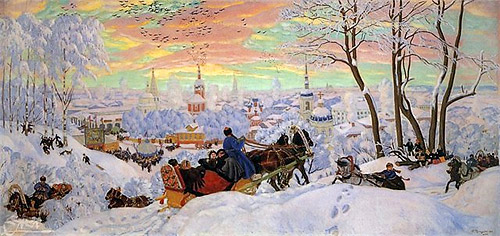 Boris Kustodiev. Maslenitsa.
Boris Kustodiev. Maslenitsa.
Maslenitsa week has begun in Russia with festivities running until Sunday. Russia has been seeing off winter and welcoming spring in this way since time immemorial. This tradition began in pre-Christian times. For today’s Russian Orthodox Christians this week, first and foremost, means preparation for the 40-day Great Lent. The name of Maslenitsa itself is closely associated with the Christian tradition, says Father Philipp Riabykh, a representative of the Moscow Patriarchate.
“In our Church the week before the Great Lent is called Cheese-Fare Week in translation from Greek. When Christianity came to Russia, Russian people did not know about cheese or butter. The name Maslenitsa was created to explain what can be eaten during these days because the word Maslenitsa is derived from the Russian word for butter. During the week before the Great Lent people may eat dairy products but are not allowed to eat meat.”
For this reason another name for Maslenitsa is “meat-fast”. Russian meat-fast is practically the same as the western Carnival, which comprises two Latin words: carnis and vale, which means “farewell beef”. The main Maslenitsa treats are pancakes. They can be made with or without yeast, from wheat or buckwheat flour and served with fish, red caviar, cottage cheese, butter, sour cream, honey or jam. There is no end to recipes. During Maslenitsa, pancakes are on the menu of both expensive restaurants and office canteens. The kitchens of the Kremlin, the Government House and the Russian Parliament will make about 10,000 pancakes during Maslenitsa week. According to surveys, 83% of Russian women will make pancakes during these days. The tradition is to visit friends and offer your guests pancakes during Maslenitsa, Father Philipp continues.
“This festival envisages friendly parties, tasty pancakes and joyfulness. All this is meant to prepare people for the Great Lent and Easter. It is much easier to forgive all wrongs done during the year in an affectionate atmosphere when friends and relatives gather together”.
Moscow has always celebrated Maslenitsa on a grand scale. The Grand Maslenitsa festival is included in the catalogue of famous international festivals and carnivals. Maslenitsa has always amazed foreign guests with its hospitality, cordiality and merry-making. A couple of years ago the Grand Maslenitsa was for the first time celebrated in the square in front of the City Hall of the British capital. After that Russian pancakes, round and golden like miniature sun discs, were offered not only to Londoners but also to the people of Dublin. This year Rome is looking forward to celebrating Maslenitsa within the framework of the Russian-Italian cultural exchange year. The festival is to open with the Russian Winter exhibition at the National Folk Art and Traditions Museum. The exhibition will show the Italians how Maslenitsa was celebrated by the Russian Imperial Court: grand balls, modest family parties and the Imperial family participating in outdoor festivities. Among the most interesting exhibits is a sleigh which belonged to the last Russian Emperor Nicholas II and the costumes of those who attended the famous Winter Palace ball in 1903 when the Czar and the courtiers wore traditional Russian clothes.
At the end of the festive week, Maslenitsa will travel to London again and the Russian Chelsea boys band will perform the Maslenitsa song in Trafalgar Square. The organizers of the festival are planning a TV link-up between Moscow and London on the 6th of March Forgiveness Sunday, when all Orthodox Christians ask each other for forgiveness for inadvertent or deliberate wrongs.
